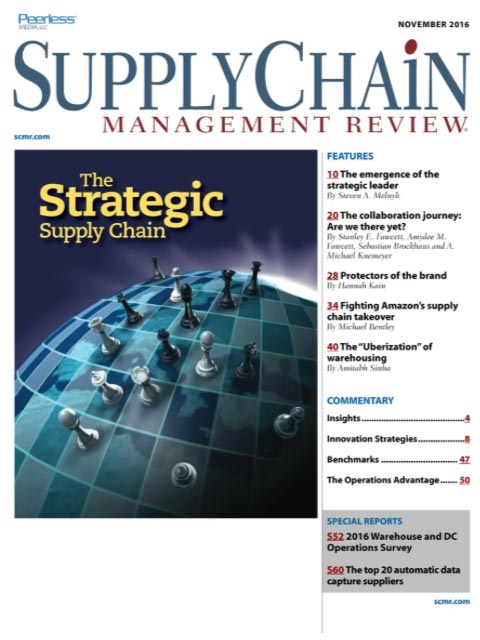Sorry, but your login has failed. Please recheck your login information and resubmit. If your subscription has expired, renew here.
November 2016
Is supply chain management strategic or tactical? Are the best supply chains collaborative? Should the goal be an integrated supply chain or an integrative supply chain? The answers are a mixed bag, according to this month’s contributors. Browse this issue archive.Need Help? Contact customer service 847-559-7581 More options
In recent years, commodity volatility has quietly slipped out of the minds of business leaders. In fact, over the past five years most commodities—though not all—have fallen substantially. Though most media attention is given to crude oil, which is half of its value from five years ago, other commodities have also fallen at a breakneck pace including corn (-44%), copper (-38%) and wheat (-30%).
Those declining prices have made many businesses look good and led economists to debate whether we are at the end of a commodity super cycle that will propel prices even lower. For example, as China tries for a “soft landing” of decelerated economic growth, commodity prices could fall further as demand slows. If so, those lower prices may give business leaders a false peace. The decline in commodity prices is already adding political pressure to do something on commodity exporters such as Australia and Saudi Arabia, and sparking political unrest in countries around the world such as Russia and Venezuela. It leads one to wonder if currency wars aren’t looming in the future, and if so, what comes next?
In fact, there is evidence that the currency wars have already started. Compounding the issue, the last two years have crushed the markets’ belief in the predictability and stability of currency values. Consider the following:

This complete article is available to subscribers
only.
Click on Log In Now at the top of this article for full access.
Or,
Start your PLUS+ subscription for instant access.
SC
MR
Sorry, but your login has failed. Please recheck your login information and resubmit. If your subscription has expired, renew here.
November 2016
Is supply chain management strategic or tactical? Are the best supply chains collaborative? Should the goal be an integrated supply chain or an integrative supply chain? The answers are a mixed bag, according to this… Browse this issue archive. Access your online digital edition. Download a PDF file of the November 2016 issue.
 |
Download Article PDF |
In recent years, commodity volatility has quietly slipped out of the minds of business leaders. In fact, over the past five years most commodities—though not all—have fallen substantially. Though most media attention is given to crude oil, which is half of its value from five years ago, other commodities have also fallen at a breakneck pace including corn (-44%), copper (-38%) and wheat (-30%).
Those declining prices have made many businesses look good and led economists to debate whether we are at the end of a commodity super cycle that will propel prices even lower. For example, as China tries for a “soft landing” of decelerated economic growth, commodity prices could fall further as demand slows. If so, those lower prices may give business leaders a false peace. The decline in commodity prices is already adding political pressure to do something on commodity exporters such as Australia and Saudi Arabia, and sparking political unrest in countries around the world such as Russia and Venezuela. It leads one to wonder if currency wars aren't looming in the future, and if so, what comes next?
In fact, there is evidence that the currency wars have already started. Compounding the issue, the last two years have crushed the markets' belief in the predictability and stability of currency values. Consider the following:

SUBSCRIBERS: Click here to download PDF of the full
article.
SC
MR


Latest Supply Chain News
Latest Podcast

 Explore
Explore
Topics
Latest Supply Chain News
- AdventHealth named top healthcare supply chain by Gartner
- Geopolitical readiness in supply chains: Strategic challenges for leaders
- Unlocking retention: The role employee engagement plays
- Can supply chain managers embrace an entrepreneurial mindset?
- Challenges to ESG reporting
- With capacity to spare, logistics real estate demand remains subdued
- More latest news
Latest Resources

Subscribe

Supply Chain Management Review delivers the best industry content.

Editors’ Picks





